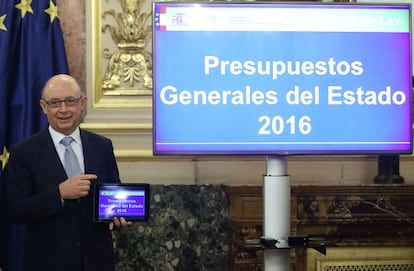Government pledges to cut taxes if it wins upcoming general elections
Budget for next year proposes 3.8% rise in social spending Public servants promised their first pay raise since 2009

With general elections looming, Prime Minister Mariano Rajoy’s government on Tuesday unveiled its long-awaited budget for 2016, which includes pay raises for public workers, increased social spending and more funds for research and development.
During a presentation in Congress, Finance Minister Cristóbal Montoro explained that the public accounts will benefit from a rise in tax revenues next year, thanks to a stronger economy, as well as lower outgoings for unemployment benefits and debt repayments.
The public accounts will benefit from a rise in tax revenues next year, thanks to a stronger economy
He explained that the savings outlined in the projected budget will allow the government to raise public workers’ salaries – by 1% – for the first time since 2009.
Nevertheless, the growing deficit in the Social Security coffers will only allow the Popular Party (PP) administration to grant seniors a 0.25% raise in their public pensions next year.
But to compensate for that, Montoro announced that more money will be allotted for needy families and educational scholarships, which will be included via a proposed 3.8% rise in social spending.
Some €5.79 billion will be allotted for research and development while the Spanish film industry stands to receive €74.5 million, a 14-percent hike from this year’s funding.
The finance minister also pledged that if the PP wins the general elections – scheduled to take place before the end of the year – the government will once again cut personal income tax rates (IRPF), “when and if there is a margin in the budget.”
The government’s last rate cut, which took effect on July 1, left income taxes at roughly the same level as they were when the Popular Party took power from the Socialists in 2011.
With his approval ratings at their lowest point, Rajoy is looking to win over Spaniards before the general elections via the early release of his government’s proposed spending plans and tax benefits. A string of high-profile public corruption scandals and painful austerity measures prescribed by Brussels have been battering the PP administration since it took office nearly four years ago.
The growing deficit in the Social Security coffers will only allow a 0.25% raise in public pensions next year
In recent months, Rajoy has been touting growth as his administration’s biggest accomplishment. Montoro explained that Spain’s recovery has been helped by low inflation and a rise in exports, which “are unprecedented factors that we need to continue pushing in the years ahead.”
Lower costs for unemployment will also help the administration increase its social spending. According to next year’s budget, the government will spend €19.521 billion less next year to pay for jobless benefits – a 12% difference on the current year.
As for regional spending, the Basque Country, Balearic Islands and Valencia will receive more money for public infrastructure projects.
The government’s last rate cut left income taxes at the same level as when the PP took power in 2011
The government has also been generous to Catalonia, raising public investment by 10%.
Rajoy’s gesture comes just two months before the northeast region faces crucial parliamentary elections, which premier Artur Mas and his pro-sovereignty bloc are framing as a plebiscite on secession.
If Congress approves the financing, Catalonia stands to receive €1.179 billion next year.
Investment in public infrastructure projects will remain about the same as it was this year. Next year’s budget proposes €9.74 billion while in 2015 investment was put at €9.49 billion.







































